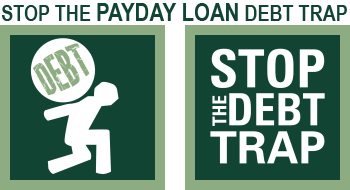Today is the day a Consumer Bureau rule was scheduled to go into effect and to begin protecting consumers from payday loan debt traps
Washington, DC – Today, the Stop the Debt Trap coalition launched the Payday Loan Debt Trap Tracker, an online tool visualizing the fees paid by American consumers to payday and car-title lenders. The debt trap – conservatively measured – drains consumers of almost $6.4 billion in fees annually, or $213 per second. The current director of the Consumer Financial Protection Bureau (CFPB), Kathy Kraninger, has proposed gutting the CFPB’s consumer protections for payday loans, and stopped the rules (finalized in 2017 under the prior leadership) from taking effect today.
Payday lenders typically charge interest rates of 300 percent APR or higher and can take money directly out of borrowers’ bank accounts. According to the CFPB’s own research, four out of every five payday loans are rolled over or renewed within two weeks, the standard period of time for repayment. As indicated by this research, borrowers are usually unable to pay off the first loan without missing payment of other obligations, such as rent, so they are caught in a cycle of borrowing to cover prior loans, known as the debt trap.
“Kathy Kraninger has effectively committed the Bureau to aiding and abetting the debt trap by removing the most important federal consumer protection against it,” said Linda Jun, senior policy counsel of Americans for Financial Reform. “Every moment without federal consumer protections on these loans means more consumers are left unprotected from the devastation caused by this predatory industry. This tracker is a numerical representation of the damage her inaction is causing.”
“This debt trap tracker gives us a valuable glimpse into how much money payday lenders’ debt trap strips away from some of the most financially vulnerable Americans,” said Rebecca Borné, senior policy counsel at the Center for Responsible Lending. “These loans consistently put consumers in a worse position than before they took out a loan. This tracker should serve as a wake up call for the Consumer Financial Protection Bureau to live up to its name and implement the payday rule, as originally written, without delay.”
“This new tracker helps explain the grim contours of how Wall Street makes it very expensive to be poor in America,” said Bartlett Naylor, financial policy advocate for Public Citizen.
“The CFPB should be protecting consumers and the local businesses that invest in their communities, not the predatory debt collectors who profit from abuse and take money out of the hands of our customers and employees,” said Amanda Ballantyne, National Director of the Main Street Alliance.
“The debt trap tracker counts money loan sharks snatched from the pockets of hard-working consumers,” said Dory Rand, president of Woodstock Institute. “Calling on CFPB director Kathy Kraninger to rein in financial predators with strong consumer protections should not be controversial when consumer protection is the central purpose—and name—of the agency she leads.”
“Everyday this administration delays actions on reeling in the abuse of payday lenders, main street suffers. Undocumented families are particularly vulnerable. This tracker shines a light on the degree of damage predatory lenders are having in California and the nation’s communities of color,” said California Reinvestment Coalition executive director Paulina Gonzalez-Brito.
“The administration has to decide what’s more important – the $2.5 million the predatory lending industry gave to the Trump campaign apparatus, or the $6.4 billion consumers will lose every year under their plan to perpetuate the debt trap,” said Jeremy Funk, spokesman for Allied Progress. “Given that Director Kraninger testified that she’s well aware that her plan robs billions from vulnerable communities but pressed forward anyways, predatory lenders have to be feeling pretty good about their standing in Trump world.”
“It is simply wrong that businesses are permitted to set financial traps designed to capture and exploit people. Our leaders in government and finance can and must do better. Each day that they fail to take action is another day that American families pay the price,” said Christopher Peterson, Consumer Federation of America’s director of financial services and senior fellow.
“Tick tock! While the Consumer Financial Protection Bureau fails to act, Americans are losing hundreds of dollars per second, as this new payday loan debt tracker makes clear. This is unconscionable, particularly when you consider that today was the day that the Bureau’s rule to finally rein in payday lenders was set to go into effect, prior to Trump-appointed Bureau leadership delaying it to allow loan sharks to continue to feast on Americans,” said Lauren Hall, Policy Advocate for Consumer Action.
In February, the CFPB proposed to delay and to rescind crucial parts of the 2017 final rule on payday lending, including the ability-to-repay provision that generally required that a lender verify a borrower could pay back the loan before it is issued. In June, the CFPB announced they would delay the original compliance date of August 19, 2019 by 15 months. They have received comments on the proposed rescission of the ability-to-repay provisions.
You can view the fees lost by American consumers due to the payday debt trap at DebtTrapTracker.com.
###
